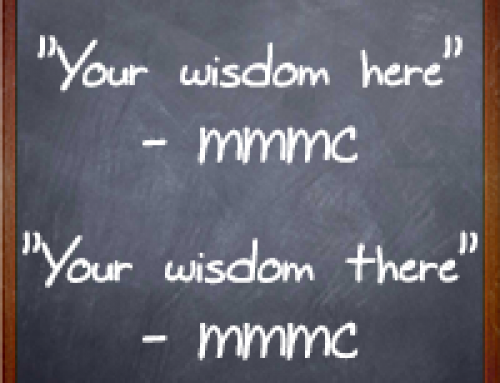Saying “No” Will Help Your Music Career
(No, Seriously!)
I know that this sounds counterintuitive, but being able to say “no” is a very important part of your music career and it will ultimately allow you to “get to the next level”.
When you first start pursuing music on a professional level, you will most likely be saying yes to almost every gig. This is usually the right thing to do because you’ll need to meet lots of people and gain valuable experiences. That being said, as you become more seasoned and busy, this dynamic will need to change or you’ll hit the wall. By “hitting the wall”, I’m referring to the point when a musician is seemingly working nonstop while ceasing to move forward with their career. This happens to many musicians at some point and can easily be remedied by learning how to trim the fat and say “NO”. You must think of your time as extremely valuable. You should hand pick the musical situations you choose to become involved with.
Musical Friendships
Now before I get into specifics here, I want to say that I’m a big fan of musical friendships. Like I’ve said in previous articles, the majority of your gigs will come from your friends and your reputation, but you can’t let these same friendships hold you back. You need to know when you’ve outgrown a situation and when it’s time to move on. This is a very touchy subject and unfortunately, one that I’ve had to deal with many times. Essentially you’ll have to make some tough decisions if you’re looking to make more money and/or have more success in the music business…or if you need more sleep…LOL. Here are a few examples below:
Example One – John Doe was the first guy who ever hired you for a paying gig. He’s been your mentor for years and you still play tip-jar gigs with him once a week at a local bar. The problem is that each gig requires three rehearsals due to the rotating band members (because of the low pay) and he constantly adds new material (which takes time to learn). Although you only make $35 on each of these gigs (4 hours each) and have to attend three rehearsals prior (combined 12 hours), he’s your friend and you don’t want to let him down. Also, you know that he is cash poor and he’s always dreaming big, so you feel bad for him. Unfortunately this situation has led to you losing out on other better paying gig opportunities due to the large amount of time it consumes. With one gig and three rehearsals per week, it’s starting to seriously hamper your potential. So, what do you do?
Example Two – You’re playing with a band that is seemingly always on the verge of “making it”, but doesn’t currently pay you any money. The band is asking for a serious commitment from you including multiple weekly rehearsals (unpaid) and gigs (unpaid). Other musicians and bands have started asking you to do paying gigs but you can’t commit to them due to the possibility of an obligation with your band. Although you’ve recently come to the conclusion that the band will probably not become successful, you’re still scared that they’ll “make it” as soon as you leave. Also, these people are your friends who you’ve shared countless experiences with and you don’t want to deal with a bad breakup. So, what do you do?
Example Three – When you first started producing tracks in your bedroom, you helped out your friend John Doe with his music. It was good experience for you at the time and it was great to hang and be creative with your friend. The production process took about 100 hours and you weren’t paid because John is a dreamer and never has any money. Now let’s fast-forward to a year later…you actually start getting paid production work, you have a girlfriend, higher rent, a needy cat, etc.; time is precious for you and you are struggling to balance your personal life with your work life. So, John gives you a call and asks you to help produce his new record. He’s super excited and he really just expects you to say yes. Since John never has any money and is always so passionate about his music, you feel really bad turning your back on him, but you just don’t have the time. The problem is, you know that John will be really crushed and won’t really understand the situation. What do you do?
How to Deal With These Situations
All right, so I could have listed many more examples above, but I think you get the idea. Essentially, all of these situations deal with friendships and all of them can potentially hold you back. There are many solutions to these problems and everyone must do what feels right to them. You basically just have to go with your gut. For instance, if you are thinking of leaving your band (example two), you can’t worry about if they’re going “make it” after you leave. You have to trust your decision to leave and not look back, no matter what the future holds. There are obviously a small amount of situations in history where a member has left a band before they became famous, but it’s rare. And in the small chance your band succeeds after you leave, you have to be cool with it. Being a professional musician means you must use your instincts, make tough decisions and move forward with blinders on. In my 20 years in the business, I can honestly say that I’ve never really regretted saying “no” to a musical situation. I’ve made many tough calls within that span, but at the end of the day it all worked out for the better. You essentially have to own your decisions and be happy with them regardless.
Some Things to Look Out For…
1) Guilt Trips – Sometimes friends, bandleaders, etc. will try to give you guilt trips in order to persuade you to participate in certain musical situations. They will dig deep, but it’s important that you hold your ground as long as you have covered your bases. What I mean by “covering your bases” is that you’ve done all that you can to help the process run smoothly. For instance, if you have to cancel a gig or quit a musical situation, you should try to find a good sub or replacement first. Also, if you have any live recordings of the shows or charts, you should forward them to the sub/replacement. If you’re dealing with a non-performance situation like composing/producing, you should recommend someone just as capable as you are. There are other ways to “cover your bases” but essentially you just want to do the right thing so that you have nothing to feel bad about and you keep your reputation intact.
2) Friendships ended – Unfortunately there are times when people will resent you for leaving a musical situation or saying “no”. Again, this is why I always “cover my bases” and help out as much as possible. If I have to get a replacement for a gig, I find someone as good or better than myself and give him or her everything needed so they can rock it! I also try to give the sub and the bandleader plenty of notice so that it’s not an emergency or a shock. If someone is still holding a grudge against me after all of that, there’s not much I can do. Since I’m always respectful and professional and since I always go beyond the call of duty in order to smooth out rough situations, I feel at peace with my actions. A matter of fact, if I receive a really negative reaction even after I’ve “covered my bases” it can sometimes justify that I’ve done the right thing, because it can confirm that there was something wrong with that musical situation in the first place.
3) Bad reputation – The last thing you want people to think about you is that you are a social climber or that you’re not dependable. If you are leaving a situation or subbing a gig, do it the appropriate way and your reputation will remain untarnished. I’ve said enough about this above…
New Opportunities
OK, I’ve been discussing current musical situations so far, but what about new opportunities?
Remember that your time is precious, so you have to analyze these situations and see if they’re truly worth your time. If a new “opportunity” will do nothing for you, it’s usually better to keep that time free for something else. You might get asked to do something better or you might not, it doesn’t really matter. You can use this time to go check out a cool band or go out networking. You can write your own music, produce some tracks, learn a new skill, learn about music business, etc. There are a million things you could do with this time and they would all be more productive than doing a crappy gig! Even sitting at home watching bad television would be better, because it might give you a needed break. If you are constantly working as a musician, your downtime is equally important and I’ll get to that point in a minute. So anyway, how do you judge these new opportunities? Let’s analyze them in five ways…
1) Money – How much is it paying? This is always important if you’re a full-time musician…LOL.
2) Time – How much of a commitment is it? Are there multiple rehearsals? Will you have to spend time learning a bunch of material? How long is the gig? Where is the gig? These are just a few necessary questions, but there are obviously many more. If you’re composing or producing a track, the same principles apply. When is the deadline? How long will it take you to complete? Will there be revisions?
3) Exposure – Will this musical situation help your career out in any way? Will you be seen or heard by a large audience or people of interest? Exposure is an important factor when balancing out the money part of the equation. Unfortunately exposure is the most abused selling point used by people attempting to get you to do free or low-paying gigs. Every free gig I’ve ever been asked to do has been pitched as a “really good opportunity” with “really good exposure” and I’ve been “lucky to be given this opportunity”…ha. You really have to use your instincts and do some detective work (seen in my post here) before deciding if these situations are right for you. I’ve definitely been involved with some good exposure type of situations, so I’m not saying that it can’t happen, but just be aware of the possible BS factor.
4) Who’s the gig with/for? – Is the gig with someone that you would like to play with, maybe someone that you’ve been hoping to play with for some time? Is the gig with cool and talented musicians that you already know and like? If you’re a writer/producer, is this opportunity through a person or company that can help your career? This is a very important factor when choosing whether or not to accept a musical opportunity. This is actually one of the most important things to me because I love good music and I also feel that associating myself with awesome musicians and awesome companies is always a good thing. As a performer, if I know that great musicians are on a gig, I’m usually sold.
5) Fun – We all started playing music because we love it, right? If a gig is fun and it’s a stress release, you might not need any other reason to take it. Of course, this totally depends on your financial situation and schedule, but fun is necessary in music and in life!
OK, so based on those factors, you have to decide if a gig is worth your time. If a gig doesn’t include any of the above elements, I would personally run for the hills.
Your Sanity and Downtime
If you work non-stop without a break you can easily get burnt out and go a little crazy, so again you must say NO to the musical situations that are not benefitting you. It’s also really important that you have other non-musical interests in order to keep you fresh. If you have your own family, you certainly have a lot going on already, but many other musicians become music workaholics and have no other outlet to the real world. Many successful musicians have specific things they enjoy in their downtime; some surf, do yoga, cook gourmet food, read books, hike, fish, watch TV, build computers, whatever. It doesn’t have to be anything special, but it has to be something non-musical that is a part of your life. So, keep this in mind when you’re saying “no” to a musical opportunity. It’s perfectly acceptable to deny a gig with no specific backup plans…even if you’re just watching “The Real Housewives of Mars” while sitting on your couch. This downtime or non-music time is necessary and will give you needed perspective in your music career.
How to Say NO
Saying “no” isn’t always easy and you have to treat every situation differently. Here’s a couple different ways to say no.
1) Random referral – If you don’t have any attachment to a person, saying no is pretty easy. Make sure you are always polite and respectful. Also, if you want to stay on good terms with this person in hopes that a better gig will come down the pipeline, you can usually just say that you’re busy.
2) Friends – Ugh, this is never easy but I think the best way to say no to a friend is by being honest. You can say something like “Music is how I pay my rent and I just need to take better paying gigs right now or I’ll be screwed. It’s not personal, this is just what I have to do to survive.” Or you can say, “With my part-time job, the wife and kids, I just really need to focus on doing some better paying gigs right now. I basically have no time to spare and I’m hurting for money”. These are just two random suggestions that may or may not match your actual situation, but I’m sure you can see the sentiment. After saying something this logical and truthful to a friend, they really should give you a break and spare you the guilt trips. If they don’t, they are being irrational…
Negotiate Instead of Saying No
I don’t want to get too deep into negotiation, because I feel that it deserves a separate article altogether. I just want to draw your attention to one situation where you might not say “no” to a bad gig. If you really don’t want to do a gig and it’s not worth your time, you can always try to ask for more money. Much of the time this will result in the people not being able to afford you, which is fine since you were going to say “no” anyway. Or the rare occasion, they will agree to your sum and then the gig will actually be worth your time. You just have to think of a monetary figure that will actually make you happy if you do the gig. Since this figure is different among musicians, I’m hesitant to give actual examples, but you get the idea. Note: I would never use this strategy on my friends or people I wanted to stay “cool” with. I would trust that they were offering me what they could and I would either say yes or no based on my advice earlier in the article.
Summary
All right, so that’s my advice, I hope it’s helpful to you. All of this info needs to be adjusted to your specific situation and your personal style. We all live different lives and we all face different challenges, but we all share the need to manage our time effectively. The bottom line is that you need to free up some space in your life so that you can get to the next level. So remember, “no” is the new “yes”!
-Adam Small

Adam’s MMMC Artist Profile
Adam’s Music Consulting & Management Page







